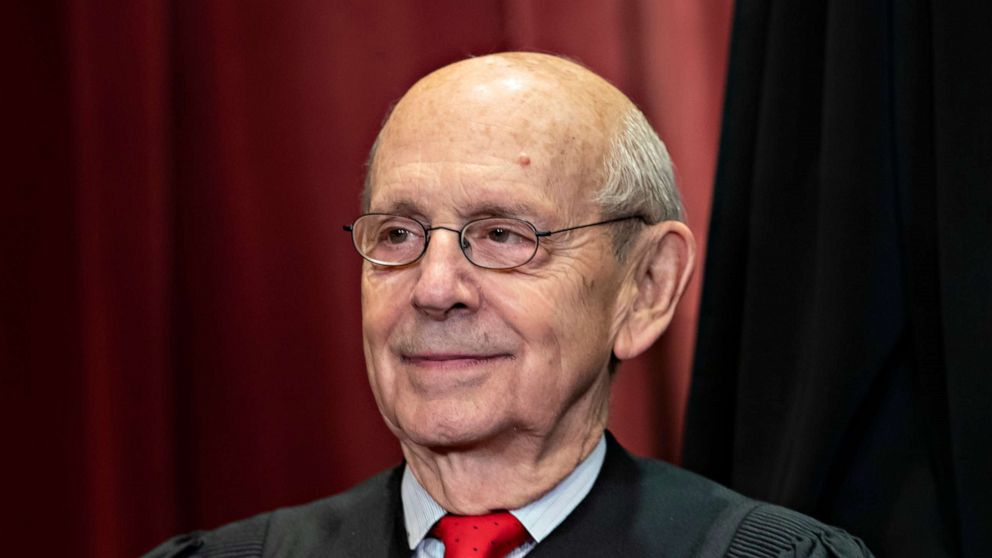Supreme Court Justice Stephen Breyer to retire at end of term
Justice Stephen G. Breyer, the most senior member of the U.S. Supreme Court's liberal wing and staunch defender of a nonpartisan judiciary, will retire from the bench at the end of the current term, fulfilling the wish of Democrats who lobbied for his exit and clearing the way for President Joe Biden's first high court appointment.
Breyer, the court's oldest member at 83, will step down despite apparent good health, deep passion for the job and active involvement in cases, three sources familiar with the situation confirmed to ABC News. There has not yet been official confirmation from the court or from Breyer's chambers.
Last term, he authored major opinions upholding the Affordable Care Act, affirming free speech rights of students off-campus and resolving a multi-billion dollar copyright dispute between two titans of American technology, Google and Oracle.
"He has been operating at the peak of his powers," said Jeffrey Rosen, law professor and president of the National Constitution Center. "It was so inspiring that this term his pragmatic vision of compromise and moderation were ascendant and all of the unanimous decisions were a moving tribute to his inspiring legacy."
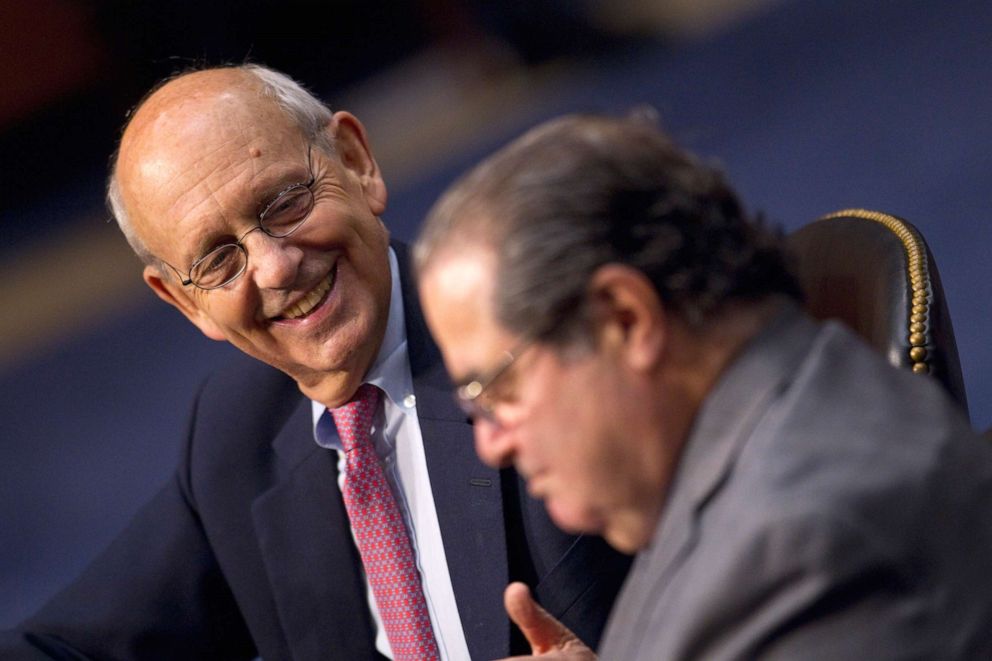
While Breyer has disavowed political considerations, many will see them in his decision to leave. Stepping down early in the Biden presidency and while Democrats retain a razor-thin majority in the U.S. Senate will help ensure his seat is filled with someone who shares his judicial philosophy.
"It's a highly personal decision," Breyer told ABC News of retirement in a 2015 interview.
Progressive activists had imposed unprecedented public pressure on Breyer, who was nominated in 1994 by President Bill Clinton, to retire. Senate Republican Leader Mitch McConnell said last June that the GOP might try to block a Democratic nominee to the court if the party wins control of the Senate in November and a vacancy occurs in 2023 or 2024.
Many Democrats remain haunted by Republican obstruction of President Barack Obama's nominee to the court in 2016 and the rushed confirmation of Justice Amy Coney Barrett last year, just weeks before the 2020 election and after the sudden death of Justice Ruth Bader Ginsburg.
In the lead up to his retirement, Breyer distanced himself from partisan politics.
"It is wrong to think of the court as another political institution," he said in an April speech at Harvard Law School. "And it is doubly wrong to think of its members as junior league politicians."
He added, justices "are loyal to the rule of law, not to the political party that helped to secure their appointment."
"He's very savvy," said Rosen. "He understands that democracy is fragile and people in the past have not obeyed the court and the court doesn't have any ability to enforce its decisions. That's why being attentive to its legitimacy is so important to him."
The vacancy now clears the way for Biden to nominate an African American woman to the court, a historic first and something he promised during the 2020 campaign.
There have been five female justices in Supreme Court history; three are currently serving -- Justices Barrett, Elena Kagan and Sonia Sotomayor, the first and only woman of color confirmed to the high court.
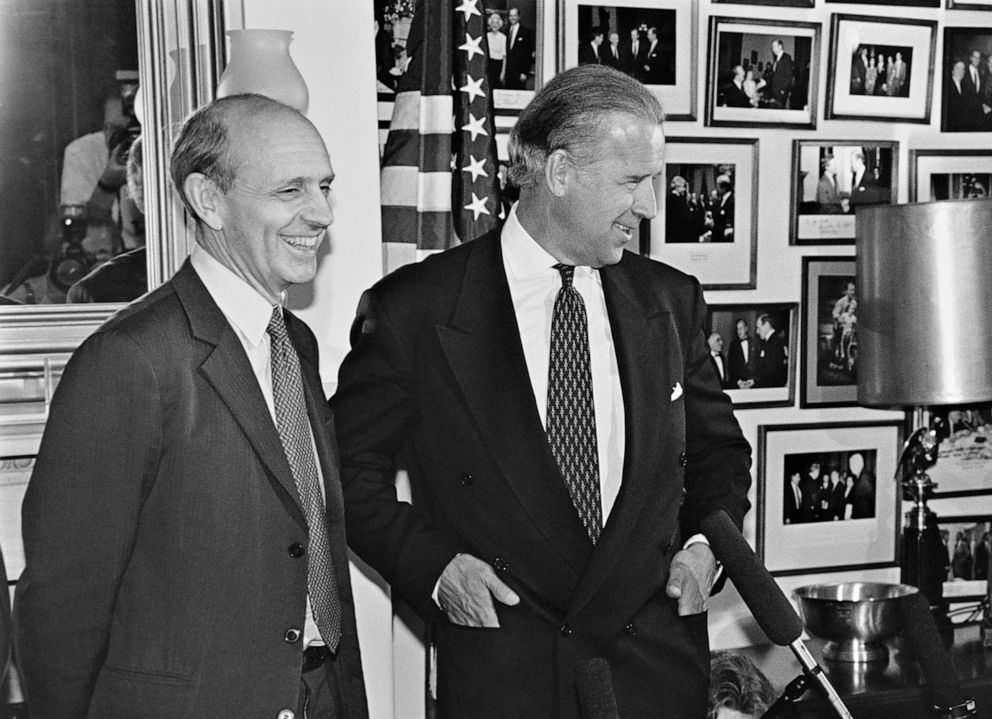
U.S. Appeals Court Judge Ketanji Brown Jackson, a former Breyer clerk, public defender and Biden appointee who won three Senate Republican votes in confirmation, is considered a top contender for nomination along with Judge Leondra Kruger of the California Supreme Court, a former deputy solicitor general in the Obama administration who has argued a dozen cases before the high court.
"We are putting together a list of a group of African American women who are qualified and have the experience to be on the court," Biden said in June 2020. "I am not going to release that until we go further down the line in vetting them."
While Breyer never enjoyed the rock-star status held by Ginsburg, he has long been revered and celebrated as a consensus-seeker and happy warrior throughout his 27 years on the court.
"He is not a dogmatist, generating rules from some high-level theory. He is in search of workable results," former federal appeals court Judge Richard Posner said of Breyer in the Yale Law Journal.
As a devout institutionalist, Breyer has passionately defended the Supreme Court's reputation as an impartial and apolitical branch of American government. He has written a book on the subject, "The Authority of the Court and the Peril of Politics."
"A judge has to do his best not to have an opinion on a political matter," he told ABC News in 2015. "And if I have an opinion, I might talk to my wife about it but I'm not going to talk to you."
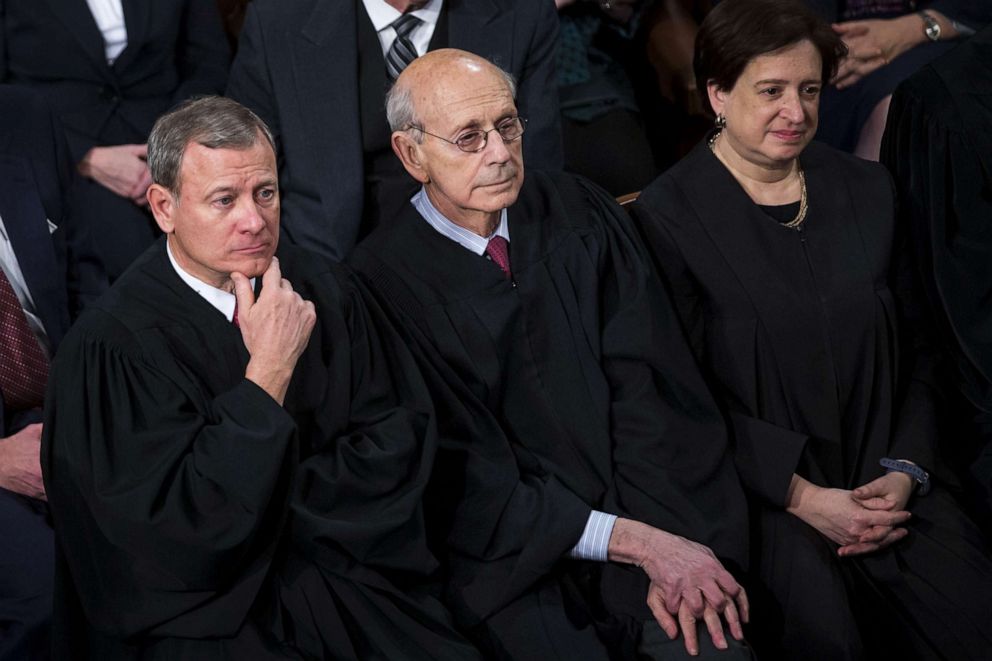
He has described differences among the justices as contrasts in "philosophical outlook" rather than differences of politics and chaffed at the labeling of justices as "liberal" or "conservative."
"Politics to me is who's got the votes. Are you Republican or Democrat? I don't find any of that here," he told ABC News Chief Washington Correspondent Jonathan Karl.
Breyer has been one of the few justices to be a regular attendee at State of the Union addresses before a joint session of Congress.
"I think it is very, very, very, important -- very important -- for us to show up at that State of the Union," the justice told Fox News in 2010. "Because people today, as you know, are more and more visual … and I would like them to see the judges too, because federal judges are also part of that government."
In recent years, as the court was repeatedly thrust into an uncomfortable spotlight during the Donald Trump presidency, Breyer joined with Chief Justice John Roberts to help steer the institution away from the headlines.
"The more the political fray is hot and intense, the more we stay out of it," Breyer explained during a 2020 interview with the Kennedy Institute.
The nine justices have handed down more unanimous opinions in 2021 than any time in at least the last seven years. Court analysts credit a narrow focus on common ground rather than sweeping, more divisive pronouncements. Some see a vindication of Breyer's longtime approach in the results.
During oral arguments, Breyer is frequently one to lean in, animatedly challenging lawyers on both sides of a debate to address the real life consequences of a case. He has earned the moniker "king of hypotheticals" for his creative use of the technique.
"You have to have the imagination to understand how those words will affect those lives," Breyer said in a 2017 interview with NYU School of Law. "That means you understand something about the lives of other people."
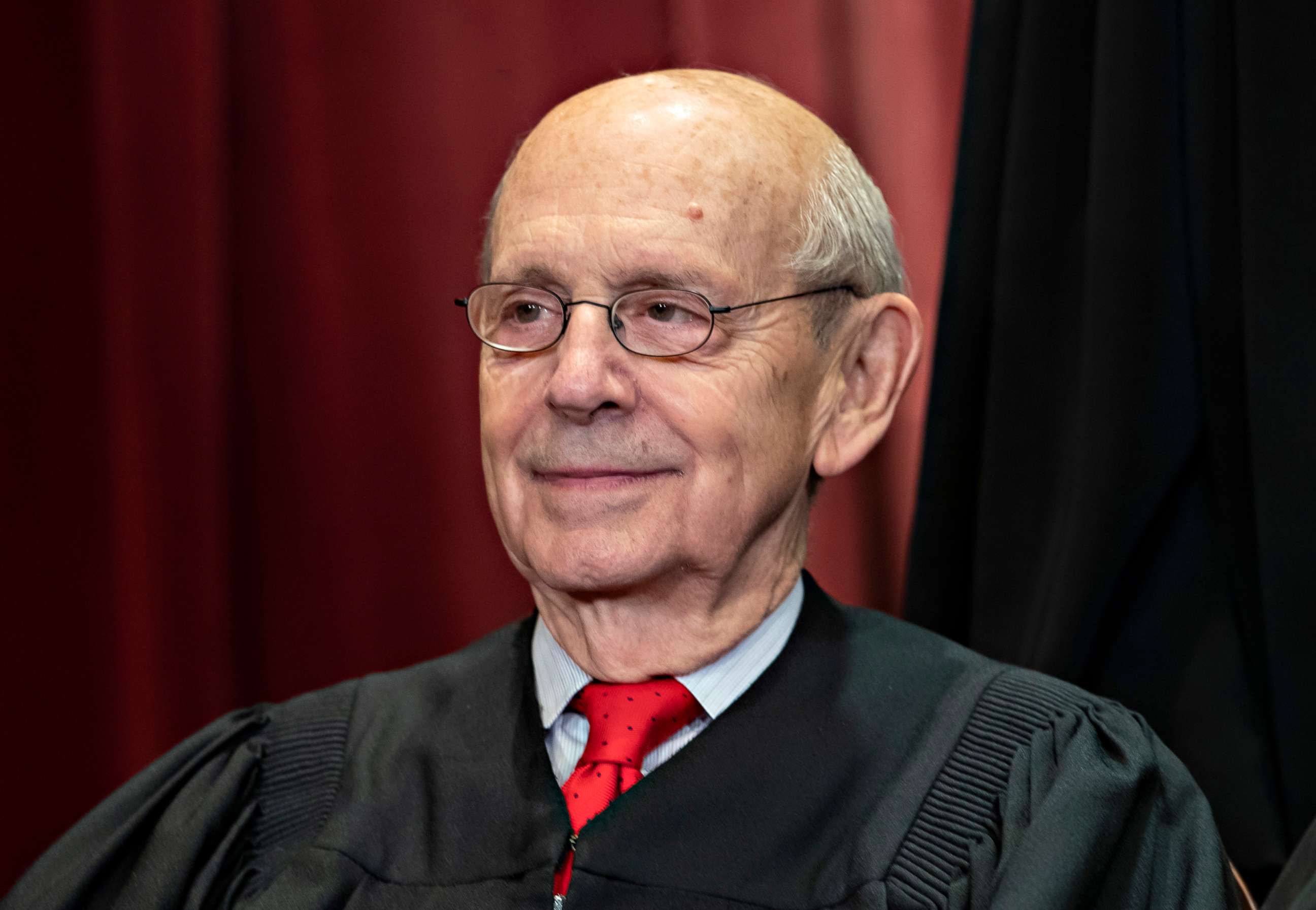
Breyer has cultivated a reputation for pragmatism and compromise in his opinions, which have been praised for their colloquial language and avoidance of jargon.
"My job ... is to write opinions," Breyer told "Fox News Sunday" in 2010. "The job of 307 million Americans is to criticize those opinions. And what they say is up to them. And the words I write are carrying out my job under the law as best I see it."
In 2014, Breyer wrote for a unanimous court to limit the scope of a president's power to make recess appointments.
"Pro forma sessions (of Congress) count as sessions, not as periods of recess," he said, dealing a rebuke to Obama who had tried to force appointments to the National Labor Relations Board. "The Senate is in session when it says it is."
He has twice authored significant majority opinions on the issue of abortion.
In 2000, Breyer wrote a 5-4 decision striking down a Nebraska law criminalizing "partial-birth abortions" as "an undue burden upon a woman's right to make an abortion decision." Two decades later, his opinion in June Medical Services v. Russo cast a Louisiana law requiring hospital admitting privileges for abortion doctors as a "substantial obstacle" to women that violates the Constitution.
On the First Amendment, Breyer was the pivotal vote in a pair of 5-4 decisions in 2005 involving public displays of the Ten Commandments. He voted to uphold a longstanding monument at the Texas state capitol, while opposing placement of framed copies of the commandments inside Kentucky courthouses. He was the only justice to agree with both decisions.
"The government must avoid excessive interference with, or promotion of, religion. But the Establishment Clause does not compel the government to purge from the public sphere all that in any way partakes of the religious," Breyer wrote in a concurring opinion in the Texas case. "Such absolutism is not only inconsistent with our national traditions, but would also tend to promote the kind of social conflict the Establishment Clause seeks to avoid."
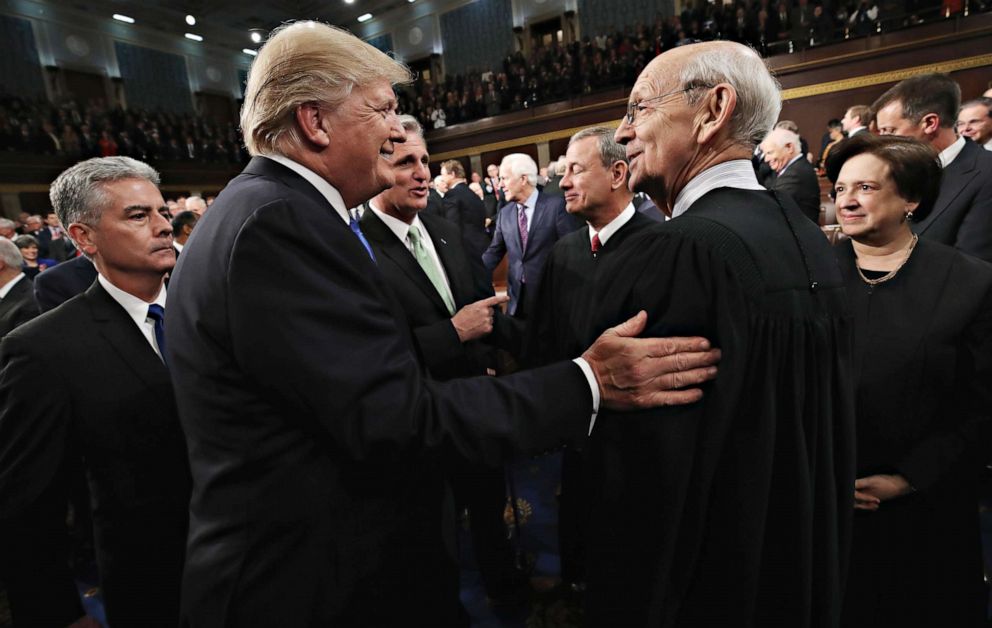
Breyer frequently championed "six basic tools" that judges should use when deciding a case -- text, history, tradition, purpose, precedent and consequences. He has also urged consideration of international law.
"When you're talking about the Constitution, different judges emphasize different ones of those," he said in a 2017 interview, "but nobody leaves any of those out completely."
When Breyer's analysis put him at odds with his colleagues, he frequently wrote in dissent, defending the use of race as a factor in school admissions; pushing for deference to legislatures on gun control laws; and, opposing partisan gerrymandering.
"The use of purely political considerations in drawing district boundaries is not a necessary evil that, for lack of judicially manageable standards, the Constitution inevitably must tolerate," Breyer wrote in a 2004 case.
In the hotly contested 2000 election, Breyer lamented the court's decision to get involved in the dispute between George W. Bush and Al Gore.
"The Court was wrong to take this case. It was wrong to grant a stay," he wrote at the time. "We do risk a self-inflicted wound -- a wound that may harm not just the Court, but the Nation."
Breyer has been a staunch critic of the death penalty and what he sees as unacceptably lengthy delays between sentences and executions.
In a famous 40-page dissent in 2015, Breyer urged the court to reconsider whether capital punishment violates the Eighth Amendment.
"Lack of reliability, the arbitrary application of a serious and irreversible punishment, individual suffering caused by long delays, and lack of penological purpose are quintessentially judicial matters," he wrote.
"They concern the infliction -- indeed the unfair, cruel, and unusual infliction -- of a serious punishment upon an individual," he continued. "The Eighth Amendment sets forth the relevant law, and we must interpret that law."
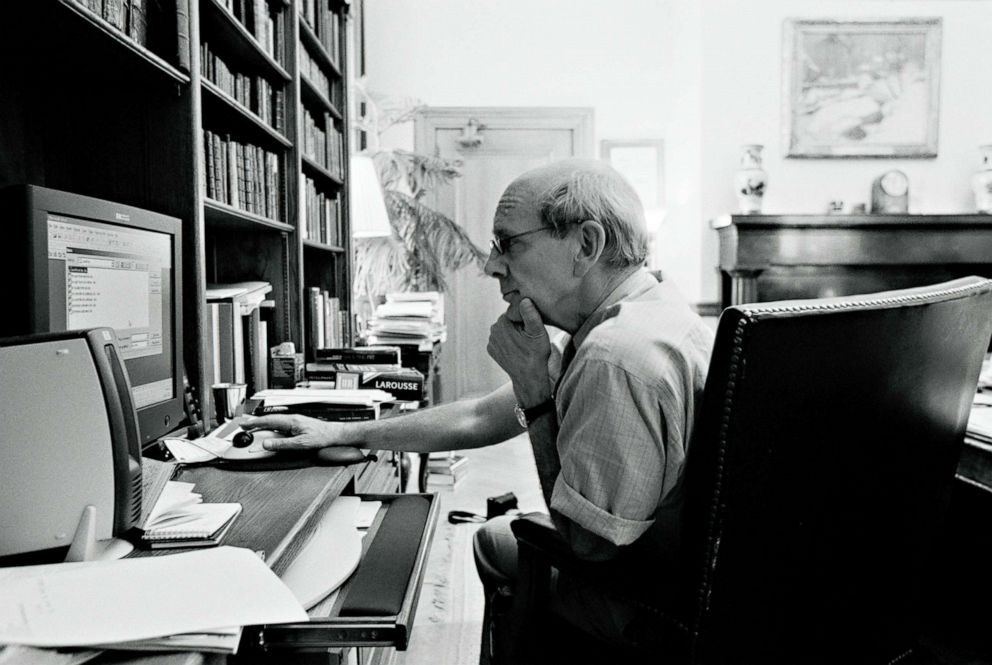
Breyer's career on the high court caps a lifetime of public service.
He grew up in San Francisco, where he attended public schools and earned the rank of Eagle Scout. In 1957, Breyer joined the U.S. Army Reserves and served a tour of active duty in the Army Strategic Intelligence during his six-year career.
He studied philosophy at Stanford University and became a Marshall Scholar at Oxford University. In 1964, he earned his law degree from Harvard University and went on to clerk for justice Arthur Goldberg on the U.S. Supreme Court.
"I'm sure they wanted me to be a lawyer," Breyer said of his parents in a 2017 oral history. "I thought, well I'd like to be a lawyer. I sort of always knew I would be."
After a short stint in the Justice Department antitrust division, Breyer joined the faculty at Harvard Law School in 1967, specializing in administrative law. That same year he married Joanna Hare, a member of the British aristocracy and a pediatric psychologist at the Dana-Farber Cancer Institute.
In the mid-1970s, he cut his teeth in politics, serving as an assistant special prosecutor in the Watergate investigation and later as special counsel to the Senate Judiciary Committee working alongside Sen. Ted Kennedy.
"A few lessons I learned from Kennedy. One of them: the best is the enemy of the good," Breyer said in 2017. "If you could get an inch, it's much better to get that inch then to complain about not getting a mile."
He was first appointed to the federal bench in 1980 by President Jimmy Carter, going on to serve 13 years as an appellate judge until Clinton elevated him to replace Justice Harry Blackmun on the Supreme Court in 1994. The Senate confirmed Breyer 87-9.
Asked in 2017 how he would like to be remembered, Breyer told an interviewer: "You play the hand you're dealt. You're dealt one. And you do the best with what you have. If people say yes, he did, he tried, he did his best and was a decent person, good."
ABC News' Rachel Scott contributed to this report.
